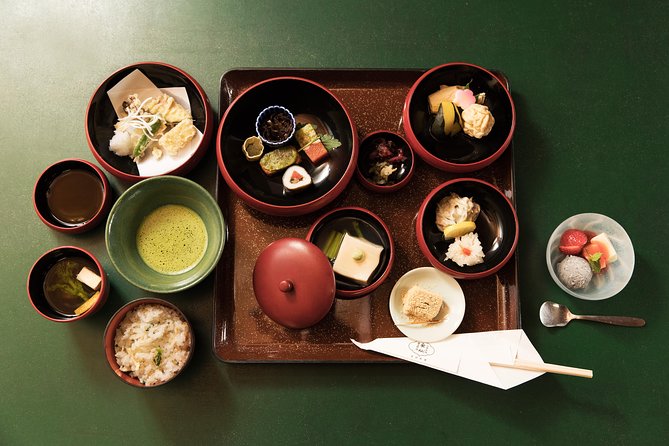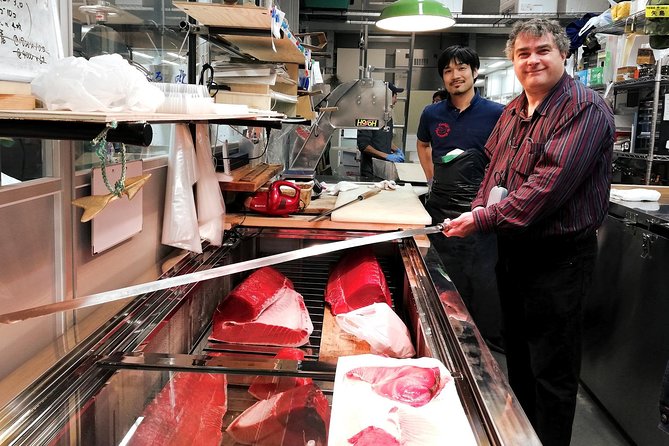Imagine stepping back in time to experience the tranquility of Zen Meditation while indulging in the simplicity of Traditional Vegan Food.
This unique fusion offers a blend of mindfulness and culinary exploration, promising a journey of the senses like no other.
As you begin to understand the harmony between the two practices, you’ll find yourself on a path towards a deeper connection with the self and the world around you.
But how exactly do these ancient traditions intertwine, and what secrets do they hold for those who dare to venture further into their depths?
Key Points

- Zen meditation promotes self-discovery and mindfulness.
- Traditional vegan cuisine honors culinary heritage with plant-based delights.
- Mindful eating enhances well-being through gratitude and intuitive habits.
- Veganism in Zen aligns with principles of compassion, health, and sustainability.
It's also worth checking out some other tours and experiences nearby.
Zen Meditation at Daisen-in Temple
Set out on a transformative journey through Zen Meditation at Daisen-in Temple, enjoying a peaceful oasis of self-discovery and mindfulness.
At this serene location, visitors can explore various meditation techniques aimed at achieving spiritual enlightenment. The one-hour experience includes a 20-minute meditation session that allows participants to connect with their inner selves and find a sense of calmness amidst the temple’s tranquil surroundings.
Whether you’re a beginner or an experienced practitioner, the Daisen-in Temple provides a welcoming space for all individuals seeking to explore the depths of meditation. This opportunity not only nurtures personal growth but also offers a chance to understand the essence of Zen practices in a traditional setting.
Vegan Food Options in Traditional Cuisine

Explore the world of traditional vegan cuisine, discovering a rich tapestry of flavors and plant-based delights waiting to tantalize your taste buds. Traditional recipes offer a glimpse into the culinary heritage of various cultures, showcasing the creativity and resourcefulness of generations past. From hearty stews to fragrant curries, there’s a diverse array of dishes to explore.
Modern twists on traditional vegan fare bring new life to classic recipes, incorporating innovative ingredients and cooking techniques. Whether it’s a vegan twist on a beloved family recipe or a fusion dish that combines flavors from different traditions, there are endless possibilities to satisfy your cravings while staying true to a plant-based diet. Embrace the delicious world of vegan cuisine, where tradition meets innovation for a truly flavorful experience.
Mindful Eating Practices for Well-being

Explore how mindfulness can enhance your well-being through conscious eating practices that nourish both body and mind. When it comes to mindful nutrition and plant-based wellness, being present while eating can make a significant difference in how you feel. By focusing on the flavors, textures, and nutrients of your food, you can cultivate a deeper connection to what you consume. Here’s a simple guide to incorporating mindful eating practices into your routine:
| Mindful Eating Practices | Benefits |
|---|---|
| Engage all senses while eating | Enhances appreciation for food |
| Chew slowly and thoroughly | Improves digestion and nutrient absorption |
| Eat without distractions | Helps in recognizing hunger and fullness cues |
| Express gratitude for your meal | Promotes a positive relationship with food |
| Listen to your body’s hunger signals | Encourages intuitive eating habits |
Cultural Significance of Veganism in Zen
Veganism holds a significant cultural role within Zen practices, emphasizing plant-based diets for spiritual and ethical reasons. Here are four key points highlighting the cultural significance of veganism in Zen:
-
Harmony with Nature: Zen philosophy promotes living in harmony with nature, and a vegan lifestyle aligns with this belief by reducing harm to animals and the environment.
-
Mindful Consumption: Veganism in Zen encourages mindful consumption, fostering awareness of the impact of our food choices on ourselves and the world around us.
-
Compassion and Non-Violence: Following a vegan lifestyle reflects the Zen principles of compassion and non-violence towards all living beings.
-
Health Benefits: Vegan diets are often associated with improved health, supporting the holistic approach to well-being in Zen practices.
Harmonizing Body and Spirit Through Food
Harmonizing body and spirit through food involves embracing a mindful approach to nourishment that honors the interconnectedness of our well-being. Choosing a plant-based diet not only benefits your health but also contributes to a more sustainable environment.
Mindful cooking is about being present in the kitchen, appreciating the ingredients, and infusing your meals with positive energy. By preparing food with love and intention, you can elevate the dining experience to a spiritual practice. Plant-based dishes rich in nutrients and flavors can nourish your body and soul, promoting a sense of balance and vitality.
Embracing this holistic approach to food can bring about a deeper connection with yourself and the world around you.
Here's a few more nearby tours and experiences we think you'll like.
Common questions
Can Beginners Participate in the Zen Meditation Session at Daisen-In Temple, or Is Prior Experience Required?
Beginners can join the Zen meditation session at Daisen-in Temple without prior experience. The session is beginner-friendly, focusing on relaxation and mindfulness practices through various meditation techniques. Participants of all levels can benefit from this experience.
Are There Any Specific Dietary Restrictions or Allergies That Need to Be Mentioned When Booking the Traditional Vegan Food Experience?
When booking the traditional vegan food experience, it’s important to mention any dietary preferences or allergies. Understanding culinary traditions and meal etiquette can enhance the dining experience. Sharing these details ensures that the meal is tailored to individual needs.
How Long Is the Recommended Duration for Practicing Mindful Eating Practices for Well-Being to See Noticeable Benefits?
For mindful eating benefits and noticeable well-being improvements, the recommended duration is typically around 20 to 30 minutes per meal. Practicing mindfulness during eating can enhance digestion, aid in weight management, and promote a healthier relationship with food.
What Are Some Common Misconceptions About the Cultural Significance of Veganism in Zen That Should Be Clarified?
Many misconceptions surround the cultural significance of veganism in Zen. Beginners should know that dietary restrictions in Zen are rooted in mindful eating practices, not deprivation. Understanding these rituals and practices can deepen one’s spiritual journey.
Are There Any Specific Rituals or Practices Involved in Harmonizing Body and Spirit Through Food That Participants Should Be Aware of Before Attending?
When aiming to harmonize body and spirit through food, participants should be aware of mindful eating practices and the spiritual connections that come with them. Being present with each bite can deepen one’s culinary experience.
Not for you? Here's more of our most recent tour reviews happening neaby
- City Escape: Arashiyama Park Private Day Trip
- Japan Kyoto Online Tours Virtual Experience
- Kyoto 8hr Private Tour With Government-Licensed Guide
- 3 Day Tokyo to Kyoto Tour (Hotels, Transport and Guide Included)!
- KYOTO-OSAKA Day Tour by Private Car and Driver (Max 4 Pax)
- Early Bird E-Biking Through East Kyoto
- Tea Ceremony in Kyoto SHIUN an
- All Inclusive 1 Day Private Kyoto Tour by a Local Born in Kyoto
- Full-Day Private Guided Tour in Kyoto, Arashiyama
- Private Full-Day Walking Tour of Kyoto
- Kyoto Sweets & Desserts Tour With a Local Foodie: Private & Custom
- 2-Hour Oriental Body and Head Massage in Kyoto Japan
- Osaka Kansai Airport (KIX) to Kyoto – Round-Trip Private Transfer
- Nara Day Trip From Kyoto With a Local: Private & Personalized
- Private Photo Session With a Local Photographer in Kyoto
Sum Up
Set out on a journey of self-discovery and culinary delight with Zen meditation and traditional vegan food. Experience inner peace at Daisen-in Temple and savor authentic plant-based cuisine at Izusen – Daijiin shop.
Dive into mindful eating practices and explore the cultural significance of veganism in Zen. Harmonize your body and spirit through this unique and enriching experience.
Book now for a serene adventure that nourishes both body and soul.





